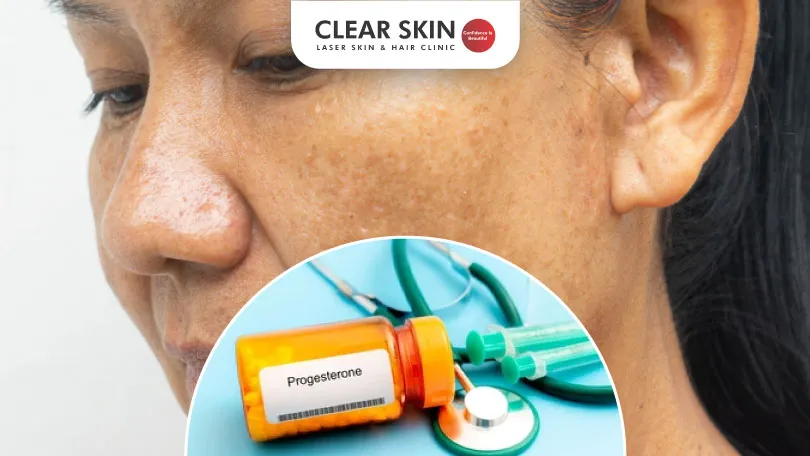Understanding the Role of Progesterone in Melasma: Causes and Treatments
Reviewed By: ![]() Dr. Dhanraj Chavan
Dr. Dhanraj Chavan
Updated on: 22nd February, 2025

Are you struggling with dark patches on your face that won’t go away? Wondering if your progesterone-based medications might be to blame? Let’s understand!
Melasma, a common skin condition that causes hyperpigmentation, can be a frustrating problem for many individuals. Hormonal changes have been implicated as one of the melasma triggers. But does progesterone cause melasma?
It’s a question that’s been on the minds of many, as progesterone is a key female sex hormone used in various medications, such as oral contraceptives and hormone replacement therapy. In this article, we will dive into the relationship between progesterone and melasma to uncover the facts and dispel the myths.
Table Of Content
- Progesterone and Melasma
- How to Manage Progesterone-Induced Melasma?
- Conclusion
Progesterone and Melasma
Melasma is a skin condition characterised by dark patches, usually on the face, and it is believed to be caused by genetic, hormonal, and environmental factors. While the exact cause of melasma is not fully understood, it is thought that hormonal changes, particularly those related to female sex hormones, can trigger or exacerbate melasma in susceptible individuals.
So, does progesterone cause melasma? Let’s explore!
Progesterone is a female sex hormone naturally produced by the ovaries during the menstrual cycle, pregnancy, and menopause. It is also available in synthetic form as a medication for various medical conditions, including hormone replacement therapy (HRT) and contraception. Some evidence suggests that progesterone, particularly in oral contraceptives and HRT, may contribute to the development or worsening of melasma in certain individuals.
Progesterone can stimulate the production of melanin, the pigment responsible for skin colour, through its effect on melanocytes, which are the cells that produce melanin. This can lead to skin pigmentation and potentially contribute to the development of melasma. However, the relationship between progesterone and melasma is complex and needs to be fully understood, as melasma is a multifactorial condition with various triggers and risk factors. A comprehensive evaluation and melasma treatment in Pune can help you to manage those dark patches.
Progesterone-containing medications, such as oral contraceptives and hormone replacement therapy (HRT), have been suggested as potential contributors to melasma in susceptible individuals.
Additionally, progesterone may also affect other factors involved in the formation of melasma, such as blood vessels and immune response.
However, not all women who use progesterone or experience hormonal changes, such as during pregnancy, develop melasma. Other factors, such as genetics, sun exposure, and skin type, may also play a role in the development of melasma. It is likely that a combination of factors, including hormonal changes and other predisposing factors, contribute to the development of melasma in susceptible individuals.
How to Manage Progesterone-Induced Melasma?
If you suspect your melasma is related to progesterone or other hormonal medications, it is important to consult a melasma doctor for proper evaluation and management.
Your dermatologist may prescribe alternative medications or adjust the dosage or duration of your current hormonal therapy to minimise the risk of melasma.
Also, he/she can recommend topical treatment, chemical peels or laser therapy.
If you are experiencing melasma and wondering about does progesterone causes melasma, contact Clear Skin Clinics in Pune, a reputable dermatology clinic, to schedule an appointment with a qualified dermatologist. Our experienced team can provide personalised recommendations and treatments for managing melasma and other skin concerns. Book your consultation today!
Do You Know?
Roughly 250 Patients Are Treated
Everyday By These Dermatologists
(You are one click away from flawless skin)
Meet Our Dermatologist!
Conclusion
In conclusion, while progesterone can play a role in the development of melasma due to its impact on hormonal balance and skin pigmentation, it is often a combination of factors, including genetic predisposition and sun exposure, that contribute to this condition. Effective management involves using sunscreen, topical treatments, and professional guidance from a dermatologist.
Further Reading
Is Tretinoin Cream Safe for Melasma? Tips and Usage Guide
Discover how tretinoin cream can safely treat melasma.
Unveiling the Potential of Face Packs for Acne Scars
Discover how homemade and customized face packs can help lighten acne marks and rejuvenate your skin.
Home Remedies for Acne Scars
Effective Home Remedies for Acne Scars
Salicylic Acid: Your Ultimate Guide to Banishing Acne Scars
Salicylic acid helps fade acne scars by exfoliating the skin and promoting cell renewal. Discover its benefits, effectiveness, and how to use it safely.
Have thoughts? Please let us know
We are committed not only to treating you, but also educating you.






